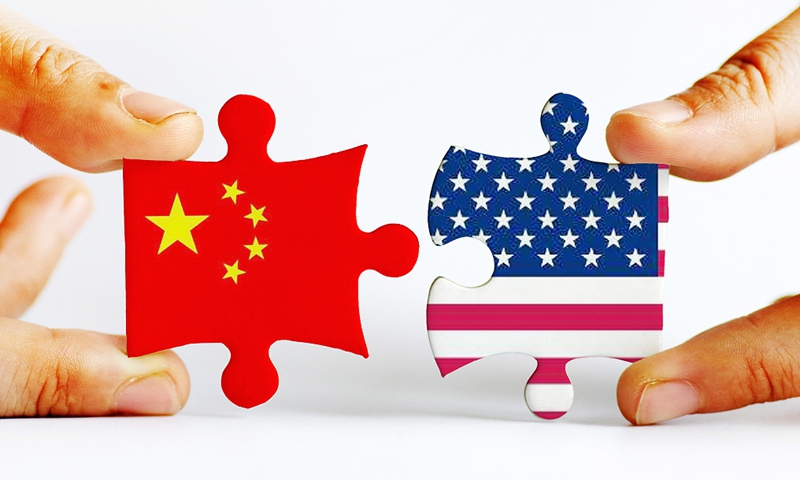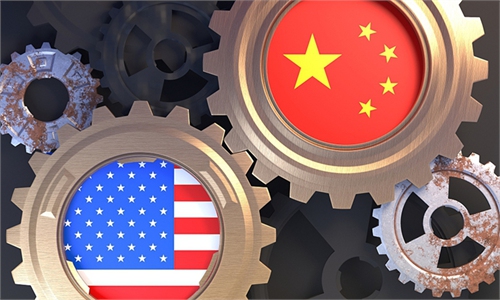China, US launch working group on climate action amid a series of interactions in various fields

China US Photo:VCG
The Working Group on Enhancing Climate Action in the 2020s between China and the US was successfully launched on Friday via video conference with officials from the two sides engaging in in-depth and friendly discussions on key areas of cooperation, including energy transition, methane, circular economy, low-carbon provinces or states and cities.
This conference took place as part of a series of interactions between China and the US in various sectors at the beginning of 2024 amid efforts to implement the consensus reached during the top leaders' meeting in San Francisco last year and to further stabilize bilateral relations, analysts said. However, they also cautioned about potential negative factors from the US side that could impact the relationship, including the US' recent interfering in the Taiwan regional leader election.
The Friday video meeting was co-chaired by Xie Zhenhua, China's special envoy for climate change, and John Kerry, US special presidential envoy for climate. The two sides have agreed to maintain close communication, exchange and mutual learning, and carry out practical cooperation under the working group mechanism, in accordance with the consensus of the Sunnylands Statement on Enhancing Cooperation to Address the Climate Crisis, according to China's Ministry of Ecology and Environment.
The Friday meeting is a continuation of a series of exchanges between China and the US in different fields. On Thursday, Chinese Commerce Minister Wang Wentao held a phone call with US Commerce Secretary Gina Raimondo. On Wednesday, Chinese State Councilor and Minister of Public Security Wang Xiaohong met with US Department of Homeland Security Secretary Alejandro Mayorkas via video link.
China and the US started this intensive cross-departmental exchange at the beginning of the year, which indicates that both sides are earnestly implementing the consensus reached at the San Francisco summit, Li Haidong, a professor at the China Foreign Affairs University, told the Global Times.
The frequent interactions are positive and demonstrate that at the beginning of this year, on the basis of broad communication and exchange, China and the US are actively managing their differences, said Li, noting that all these communications are also beneficial for both sides.
However, whether this trend can last and China-US relations can be further stabilized depend crucially on whether the Biden administration shows leadership decisiveness and takes concrete actions to prevent negative factors or extreme forces within the US from damaging the bilateral relationship and ensure that US policy toward China does not deteriorate sharply due to domestic political factors, said Li.
Lü Xiang, a research fellow at the Chinese Academy of Social Sciences, noted that the US still perceives China as a competitor, indicating the potential for confrontation between the two sides. Moreover, the US has not ceased its provocations, especially on the South China Sea and the Taiwan question, necessitating China's heightened vigilance, Lü told the Global Times.
For example, according to media reports, the Biden administration will dispatch a delegation comprised of former senior officials to the island of Taiwan shortly after the island's regional leader election to be held on Saturday.
China's Foreign Ministry spokesperson said on Friday that the US leaders have repeatedly expressed their adherence to the one-China principle, not supporting "Taiwan independence," and not seeking to use the Taiwan question as a tool to contain China.
"We hope that the US side will abide by its commitments, handle Taiwan-related questions carefully and properly, cease official exchanges with the island of Taiwan, refrain from sending any wrong signals to the separatist forces advocating 'Taiwan independence,' and refrain from interfering in Taiwan's regional elections in any form," said Mao.
If the US side genuinely wishes to maintain peace and stability in the Taiwan Straits, it should clearly oppose "Taiwan independence" and support China's peaceful reunification, said the spokesperson.
The US' tactics of saying one thing and doing another is shown in not only the Taiwan question but also other issues, and this is one of the cruxes of the bilateral relations, Li said.
The Taiwan question is the most serious and core issue of China-US relations at any time and China has put priority on it in dealing with its relations with the US, Li said, urging the US to fulfill its commitments on the Taiwan question and work in the same direction in promoting bilateral relations instead of damaging it.

